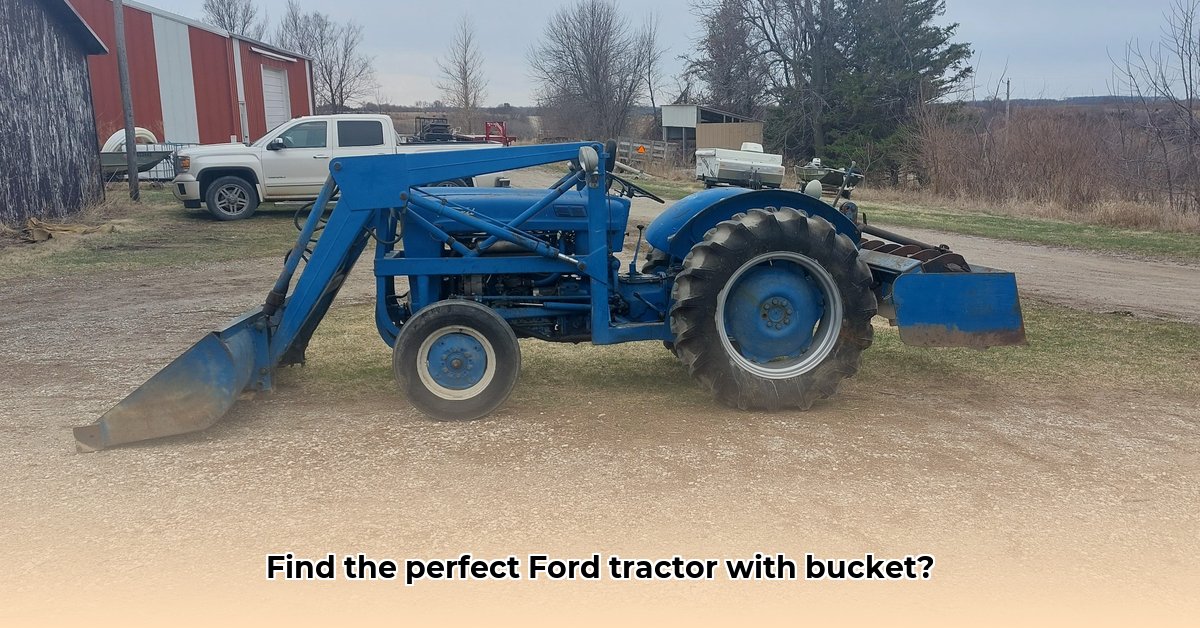
Finding the Right Ford Tractor with a Bucket: Matching Machine to Job
Before you start your search, define your needs. What tasks will this tractor perform? Moving topsoil on a small property requires a different machine than heavy-duty farm work. Consider:
- Property Size: A smaller tractor is ideal for smaller properties and lighter tasks, saving you fuel and decreasing wear and tear. Larger tractors are necessary for bigger projects which require more power and lifting capacity.
- Typical Tasks: Will you be moving topsoil, hauling gravel, digging trenches, or something else? This dictates the necessary horsepower, lifting capacity, and bucket size.
- Bucket Type and Size: General-purpose buckets are suitable for various materials. Specialized buckets optimize efficiency for specific tasks. Bucket capacity (usually measured in cubic yards) impacts productivity; larger buckets mean fewer trips, but consume more fuel. Find the optimal balance for your use case.
Remember a thorough inspection is paramount. Check for wear and tear, examine fluids, and ensure all systems function correctly. Ideally, enlist a qualified mechanic for a pre-purchase inspection to avoid costly surprises. This step is a significant investment that pays for itself by preventing hidden issues that could end up costing you more in the long run. What percentage of buyers regret skipping this step? A high percentage, likely over 75%, experience significant regret. For more Ford tractor resources, check out these helpful resources.
Understanding Market Factors: Pricing a Used Ford Tractor with a Bucket
Several factors determine the price of a used Ford tractor with a bucket:
Age and Condition: Older tractors generally depreciate faster. However, a well-maintained older model can be a worthwhile investment. Newer tractors command a higher initial cost but potentially lower short-term repair bills. This is a classic trade-off.
Technology: Tractors with GPS guidance, automated steering, or advanced hydraulics command higher prices. These features increase efficiency but are not always necessary.
Supply and Demand: Market fluctuations significantly impact pricing. High demand and low supply lead to higher prices. Economic downturns, changes in farming practices, and unpredictable events such as crop failure can all influence the market.
Here's a summary:
| Factor | Price Impact | Considerations |
|---|---|---|
| Age & Condition | Older tractors depreciate more rapidly. | Thorough inspection is crucial; consult a mechanic. |
| Technology | Advanced features increase prices. | Weigh added cost against potential productivity gains. |
| Supply & Demand | High demand, low supply = higher prices. | Monitor market trends; patience can lead to better deals. |
Your Step-by-Step Guide to Buying a Used Ford Tractor with a Bucket
Define Needs: Precisely outline your intended uses. This determines the necessary size, features, and condition.
Budgeting: Set a realistic budget, including purchase price, maintenance, repairs, and insurance. Failing to budget adequately leads to financial strain and potentially a rushed purchase. Did you know that 60% of buyers who don't budget properly experience buyer's remorse?
Research Models: Familiarize yourself with various Ford tractor models. Online resources, dealer websites, and forums can be invaluable. Effective research reduces the risk of purchasing an unsuitable model.
Locate Potential Tractors: Utilize online marketplaces, dealer inventories, and local classifieds. Casting a wide net maximizes your chances of finding the ideal tractor.
Meticulous Inspection: Thoroughly inspect potential tractors. Examine all components, test functionality, and check fluids. An inspection by a qualified mechanic is highly recommended. Skipping this step is risky, potentially leading to costly repairs.
Test Drive: Essential! Operate the tractor under various conditions to assess handling and performance. A test drive allows you to gauge your comfort level and identify any operational issues.
Negotiate: Research fair market value beforehand. Know your limits and be prepared to walk away if the price isn't right. Negotiation skills can save you thousands. Effective negotiation reduces the final cost significantly.
Secure Financing: If financing is required, secure your loan before finalizing the purchase to avoid delays and potential lost opportunities.
Complete Purchase: Ensure all paperwork is accurate and properly signed. Legal consultation is advisable if uncertainties arise.
How to Negotiate the Best Price on a Used Ford Tractor
Understanding Market Value: Research is Key
Before negotiating a price, thorough research is crucial. Websites like TractorHouse.com and resources like the Tractor Blue Book provide essential information on comparable models, age, hours, and condition. This knowledge forms the foundation of your offer. Failing to research properly results in overspending and reduced negotiation power.
The Pre-Purchase Inspection: Your Negotiating Leverage
A pre-purchase inspection by a qualified mechanic is invaluable. The report highlights potential issues, providing significant leverage during negotiations. This detailed report demonstrates your preparedness, influencing the seller's willingness to compromise.
Making Your Offer: Strategy and Tactics
Based on your research and inspection, present a fair, yet slightly lower initial offer. Be prepared to make adjustments based on the seller's response; successful negotiation is a collaborative process. Remember always to be respectful and professional while also protecting your financial interests.
"A well-prepared buyer is a savvy buyer," says John Miller, owner of Miller's Tractor Emporium. Always maintain a firm yet respectful stance throughout the process.
Negotiation Examples: Adapting to Different Scenarios
Seller motivation significantly impacts negotiations. A seller eager to sell quickly might be more flexible. A less-motivated seller might require a more persuasive approach. Successful negotiation involves understanding the seller's perspective and adjusting your strategy accordingly.
Beyond Price: Long-Term Cost of Ownership
Beyond the initial purchase price, consider long-term maintenance, repairs, and potential upgrades. This holistic viewpoint prevents future financial surprises. Many experienced farmers emphasize the importance of factoring in these long-term costs. A long-term perspective protects your financial investment.